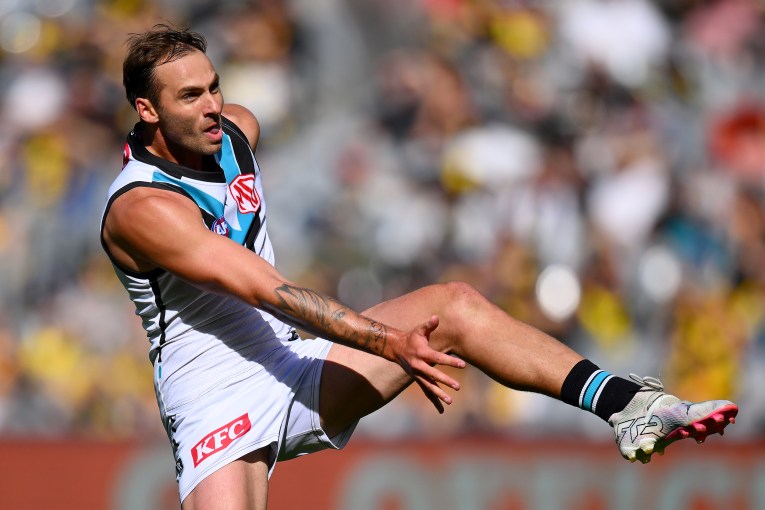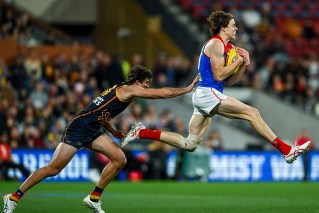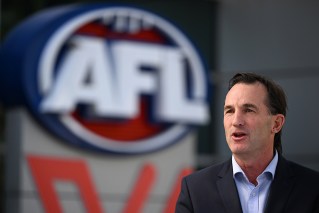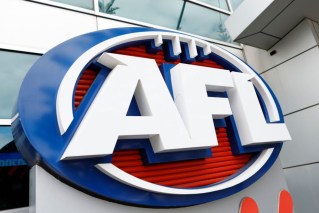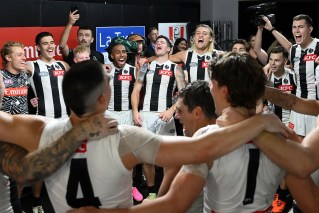The never-ending ballad of Slim Dusty Fletcher

• Cats storm home to defeat Crows
• Dons name three for AFL debuts
• Tania Hird accuses AFL boss of peptides tip-off
The year is 1993: Paul Keating is Prime Minister, people still use fax machines, and Greg Anderson’s mullet is considered an acceptable hairstyle for an adult male. The draftees of 2012 and 2013 are not yet born.
It is the era of the full forward: three of the greatest, Gary Ablett Senior, Jason Dunstall and Tony Lockett are kicking bags of goals like it’s going out of fashion – which, sadly, it is. Into all of this walks a 17-year-old with a spindly frame and, let’s be honest, terrible posture.
Fletcher’s continued involvement in the game constitutes a major setback to conventional sports science.
Most young key position prospects tend to take a while. They need to adapt to the physical rigours of the game, and their team needs to evaluate their strengths and weaknesses away from the unforgiving environment of the goalmouth. Dustin Fletcher was not most key position prospects. He walked into Essendon’s senior team as a schoolkid and held down the full-back position in a flag-winning side.

Big job: Fletcher goes to Stephen Kernahan in the 1993 grand final, just his 17th senior game. Photo: Getty
Fast forward 21 years. Most key-position veterans fade out of the game in their early 30s, their legs gone, their bones ground to dust by a decade of exertions and collisions. Dustin Fletcher is not most key-position veterans. In his 39th year, he is about to break the Essendon games record and move to outright fourth on the VFL/AFL career games list, ahead of Simon Madden and behind only Robert Harvey, Kevin Bartlett and Michael Tuck. He can still be found negating opponents, before drifting into space and launching counter-attacks with the bio-mechanical wonder that is his right foot. Indeed, Fletcher’s continued involvement in the game constitutes a major setback to conventional sports science.
How is this even possible? How can a bloke not only survive but thrive in two distinct eras of the game, 20 years apart?
Well, Fletcher has managed the feat by combining his remarkable physical attributes with fierce competitive courage and a peerless football intelligence. He established himself in the 1990s as an old-school, one-on-one full-back, using his closing speed to keep up with full-forwards on the lead, and using his telescopic arms to make spoil after dispiriting spoil.
Today’s hyper-professional, tactically ornate game bears only a faint resemblance to the one that Fletcher entered 21 years ago, but it suits him just as well. Pure negation is no longer the go: defending is a collective effort, and the ability to run, carry and use the ball by foot is imperative for any defender. Telescopic arms, though, are still very useful. Generally playing on the third tall, Fletcher has mastered the art of leaving his man and snuffing out danger. He has become a weapon in his own right as well, peeling away from the contest and launching counter-attacks with his loping runs and penetrating delivery.
Paolo Maldini, one of the greatest defenders in soccer’s recent history, averaged half a tackle per game – he famously said if he needed to make a tackle, it meant that he’d made a mistake. Fletcher is cut from the same cloth. He’s capable of tackling, chasing, harassing and, of course, spoiling, but his preternatural ability to read the play means he’s unlikely to be seen engaging in these undignified acts unless absolutely necessary. He’s more about gliding in front of an opponent to take an intercepting mark than engaging him in a wrestling match. Yes, he’s been lucky with injuries, but he’s given himself every chance by fighting (and winning) battles with his brain, rather than his body.
Longevity may be one measure of excellence, but it also tends to desensitise the viewer to said excellence. Fletch has been so good, for so long, that we take him for granted. He’s not only the last man standing from the Bombers’ 1993 flag side, he’s also the last of the 2000 Premiers. That team put together the most statistically dominant season in history, and Fletch won the Crichton Medal as Essendon’s best and fairest. That was 14 years ago, and his level has dropped only a little since then. Tucky will be looking over his shoulder.
